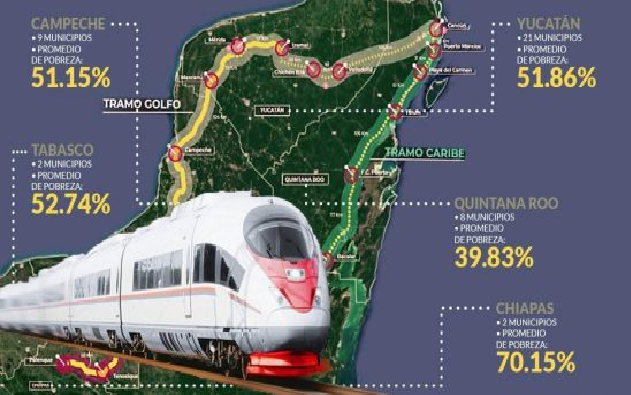The promoters of the Maya Train eliminated negative aspects related to its route, demand, and construction risks provided in the ‘Financial Economic Advisory’ by the consulting firm PWC.
MÉXICO, June 28, 2021, (EL UNIVERSAL).- The promoters of the Maya Train hid critical information related to its route, the possible demand, and the construction risks to accelerate the works and tenders of the pharaonic legacy that Andrés Manuel López Obrador wants to leave as president of Mexico.
The reports of activities, several documents, and drafts delivered throughout the year 2019 carried out by the consulting firm PriceWaterhouseCoopers (PWC), to which the National Fund for the Promotion of Tourism (Fonatur) paid 32 million pesos for the Financial Economic Advisory, reveal that they hid data and censored sections in the Cost-Benefit Analysis that must be submitted to the Ministry of Finance and Public Credit to give the green light to a project.
Among the almost 7,500 pages that PWC delivered to Fonatur, it is observed how different criticisms and details were eliminated from the final reports while the delays accumulated. AMLO has warned on several occasions that he wants to leave the Maya Train running at the end of 2023 and has repeatedly spurred the companies in charge of its construction to accelerate the works.
This megaproject consists of 1,500 kilometers of railway to create a loop in the Yucatan peninsula. It has three economic axes: tourism, local transport, and merchandise. In 726 kilometers it dismantles and rebuilds the existing tracks for the Tehuantepec Isthmus Railroad and the rest will be new tracks. The two most complex sections, without a built road and that cross the Calakmul and Sian Ka’an Biosphere Reserves, will be built by the Army.
It is not the first time that the authorities have criticized the Maya Train in reports commissioned by themselves, nor that they twist the legislation to speed up deadlines, nor that they are singled out for only talking about the benefits of the project and never about its risks.
In December 2019, EL UNIVERSAL published testimonies collected along the route that complained about the lack of information to be able to decide in the consultation held that month in the indigenous communities to approve the Maya Train. This was confirmed by the United Nations (UN) Human Rights Division, which said that the vote did not comply with international standards and that only the benefits were reported and not the possible negative impacts.
Later, it was documented how at the end of September 2019 the National Council of Science and Technology invited more than 30 researchers to form this group to study the effects and publish an analysis before the consultation. Seeing that he was critical of the project, its publication and dissemination were stopped on several occasions and it only came to light once the concealment was denounced.
In June 2020, Fonatur decided to twist environmental legislation against the advice and analysis of environmental consultants and studies to start construction without having an Environmental Impact Statement (MIA).
Finally, the MIA for the first three sections of the Maya Train was approved on November 30, 2020, when the works had already been progressing for months. Widely answered by experts and associations, one of the aspects that it does not contemplate are the so-called development poles along the route. Five studies commissioned by Fonatur list some of its potential dangers: environmental problems, bringing disorderly urban development, increasing predatory tourism, and converting ejidos into hotels.
According to El Universal, both Fonatur and the Presidency have intimidated and criminalized critics of the Maya Train. The residents of historic and new neighborhoods on the side of the railway have been labeled as invaders and profiteers; and social and environmental organizations are accused of being traitors to Mexico, arguing with fallacies that they are paid by the United States to attack the project
40% of the right of way is occupied by constructions and families who prefer to say “forced eviction” than “consensual relocation”. It was also documented that some courts are fleeing from the injunctions against the project, having to be forced by collegiate courts to admit appeals against the megaproject, while the protected citizens feel criminalized by Mexico’s executive power.
Source: El Universal



